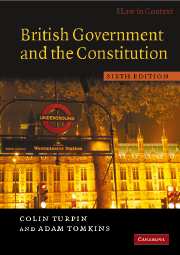11 - Liberty and the Constitution
Published online by Cambridge University Press: 05 June 2012
Summary
This chapter examines the extent to which, and the ways in which, British constitutional law protects various aspects of personal liberty – of what may be called ‘civil liberties’. This is a very large topic, as well as being a critically important one, and we have had to be selective. In our selections we have tried to focus on issues that are both topical in early twenty-first century Britain and representative of the overall field. We start with a survey of the relevant sources of law. In the next section we move on to examine the regime of Convention rights that was introduced into UK law by the Human Rights Act 1998. In doing so we pay particular attention to the impact of Convention rights in areas touching upon matters of national security and counter-terrorism. This section may be read as a case study of the way in which the Human Rights Act has worked thus far. The chapter closes with two further case studies of the way in which liberty is protected in Britain. These case studies, concerning freedom of expression and freedom of assembly, consider both common law and statute and seek to place the Human Rights Act in the context of an analysis of the overall strengths and limitations of the constitutional protections of liberty in Britain.
- Type
- Chapter
- Information
- British Government and the ConstitutionText and Materials, pp. 727 - 818Publisher: Cambridge University PressPrint publication year: 2007

